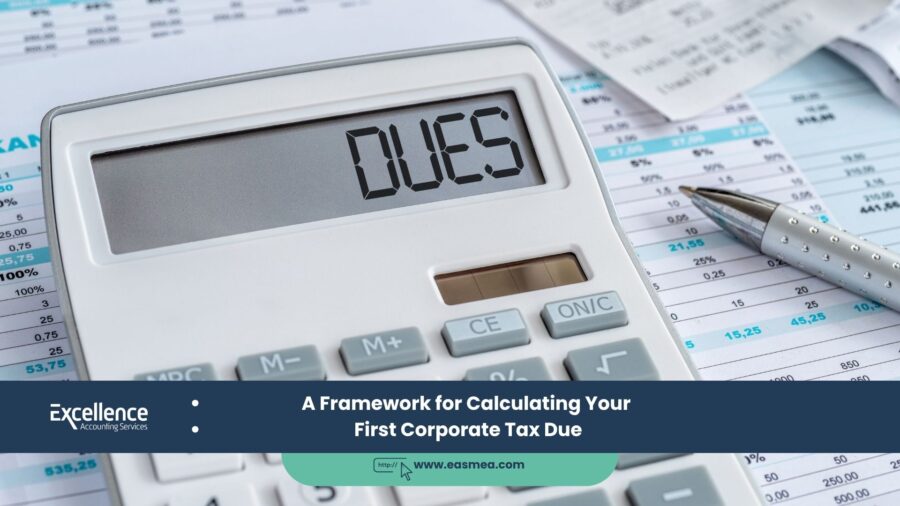A Framework for Calculating Your First Corporate Tax Due
For businesses across the UAE, the deadline for filing the first Corporate Tax return is approaching. This marks a pivotal moment in the country’s financial landscape, moving theoretical knowledge into practical application. The process of calculating your final tax liability, however, is far more nuanced than simply applying 9% to your bottom-line profit. It requires a structured, methodical approach to bridge the gap between your accounting records and the specific requirements of the UAE Corporate Tax Law.
- A Framework for Calculating Your First Corporate Tax Due
- Step 1: The Foundation - Your IFRS-Compliant Financial Statements
- Step 2: Building the Bridge - Adjusting Accounting Profit to Find Taxable Income
- Step 3: The Final Calculation - Applying the Tax Rates
- Streamlining Your Calculation with Zoho Books
- What Excellence Accounting Services (EAS) Can Offer
- Frequently Asked Questions (FAQs)
- Ensure Your First Tax Filing is Accurate and Compliant.
This article provides a clear, step-by-step framework for calculating your company’s first Corporate Tax liability. We will demystify the journey from your IFRS-compliant financial statements to the final tax figure payable to the Federal Tax Authority (FTA). By understanding how to adjust your accounting profit for non-deductible expenses and non-taxable income, you can ensure an accurate, compliant, and defensible tax position. This is not just a compliance exercise; it’s a critical test of your business’s financial literacy and preparedness for the new tax era.
Key Takeaways for Calculating Your Tax Due
- Start with Financial Statements: Your audited or unaudited IFRS-compliant financial statements are the mandatory starting point.
- Accounting Profit is Not Taxable Profit: You must make a series of specific adjustments to your accounting profit to arrive at your “Taxable Income.”
- Identify Non-Deductible Expenses: Costs like certain entertainment expenses, fines, and penalties must be added back to your accounting profit.
- Recognize Non-Taxable Income: Income such as dividends from a ‘participating interest’ must be deducted from your accounting profit.
- Apply the Tiered Tax Rates: The final calculation uses a 0% rate for the first AED 375,000 of Taxable Income and 9% for the excess.
Step 1: The Foundation – Your IFRS-Compliant Financial Statements
The entire Corporate Tax calculation begins with one document: your company’s annual financial statements. The law mandates that these statements must be prepared in accordance with International Financial Reporting Standards (IFRS). The key figure you need from your Profit and Loss (P&L) statement is your Net Profit Before Tax, often referred to as “Accounting Profit.”
This is the most crucial starting point. If your books are not in order, your entire tax calculation will be built on a flawed foundation. This underscores the importance of professional accounting and bookkeeping and accurate financial reporting throughout the year.
Let’s assume a sample company, “Dubai Mainland Traders LLC,” has a Net Profit Before Tax of AED 950,000 as per its P&L statement. We will use this figure as our starting point.
Step 2: Building the Bridge – Adjusting Accounting Profit to Find Taxable Income
This is the core of the tax computation process. We must adjust the AED 950,000 Accounting Profit for items that are treated differently for tax purposes than they are for accounting purposes.
A) Add Back: Non-Deductible and Partially Deductible Expenses
Certain expenses, while legitimate business costs recorded in your P&L, are either not deductible or only partially deductible for Corporate Tax. You must identify these and add them back to your profit figure.
- Entertainment Expenses (50%): If Dubai Mainland Traders spent AED 60,000 on client entertainment, only 50% (AED 30,000) is deductible. The remaining AED 30,000 must be added back.
- Fines and Penalties: The company paid a AED 5,000 administrative penalty. This is completely non-deductible and the full AED 5,000 must be added back.
- Donations to Non-Approved Charities: A donation of AED 10,000 was made to a charity not listed as a “Qualifying Public Benefit Entity.” The full AED 10,000 must be added back.
- VAT Penalties: Any penalties paid to the FTA for VAT non-compliance are non-deductible.
B) Subtract: Non-Taxable Income
Conversely, some income included in your Accounting Profit is exempt from Corporate Tax. This income must be deducted.
- Dividends from a Participating Interest: Dubai Mainland Traders received AED 50,000 in dividends from a subsidiary in which it holds a 15% stake for over a year. This qualifies as income from a “participating interest” and is exempt. The full AED 50,000 is subtracted.
- Other Exempt Income: This category could also include certain capital gains from qualifying shareholdings or income from a foreign branch for which a foreign tax credit will be claimed. For our example, we’ll stick to the dividend income.
C) Other Adjustments (e.g., Transfer Pricing)
If the company had transactions with related parties (e.g., sister companies, owners) that were not at an “arm’s length” price, the FTA could require an adjustment. For simplicity, we will assume all related party transactions for our example were at market value, requiring no adjustment. This is an area where services like business valuation become critical.
Calculating Taxable Income: The Worked Example
| Description | Amount (AED) |
|---|---|
| Accounting Net Profit Before Tax | 950,000 |
| Add: Non-Deductible Entertainment (50% of 60,000) | 30,000 |
| Add: Non-Deductible Penalties | 5,000 |
| Add: Non-Deductible Donations | 10,000 |
| Less: Exempt Dividend Income | (50,000) |
| Total Taxable Income | 945,000 |
As you can see, the Taxable Income (AED 945,000) is different from the original Accounting Profit (AED 950,000). This is the figure we will use to calculate the tax.
Step 3: The Final Calculation – Applying the Tax Rates
The UAE Corporate Tax system uses a tiered approach. The calculation is straightforward once you have your final Taxable Income figure.
- First AED 375,000 of Taxable Income: Taxed at 0%.
- Taxable Income exceeding AED 375,000: Taxed at 9%.
Let’s apply this to Dubai Mainland Traders’ Taxable Income of AED 945,000:
- Tax on the first AED 375,000 = 375,000 * 0% = AED 0
- Taxable amount subject to 9% = 945,000 – 375,000 = AED 570,000
- Tax on the excess amount = 570,000 * 9% = AED 51,300
Total Corporate Tax Due = AED 0 + AED 51,300 = AED 51,300
Streamlining Your Calculation with Zoho Books
Performing these adjustments manually is prone to error and incredibly time-consuming. A robust, FTA-accredited accounting platform is essential to make this process efficient and accurate.
Zoho Books is designed for the UAE’s tax landscape. It allows you to create a specific, tax-sensible chart of accounts from the outset. For instance, you can create separate expense accounts like “Entertainment – Deductible” and “Entertainment – Non-Deductible.” This ensures that when you generate your P&L, the figures needed for your tax adjustments are already segregated, saving hours of manual analysis. A proper accounting system implementation is the first step toward simplifying your tax calculations.
What Excellence Accounting Services (EAS) Can Offer
This framework provides a clear path, but the devil is in the details. Accurately identifying every adjustment requires deep expertise in both IFRS and the UAE Corporate Tax Law. EAS offers end-to-end tax services to ensure your first tax calculation is flawless.
- Tax Computation and Preparation: We take your financial statements and prepare a detailed, documented tax computation, ensuring all adjustments are correctly applied before preparing your final Corporate Tax return for filing.
- Accounting Review: Our accounting review service can assess your existing bookkeeping to identify potential problem areas for tax deductibility before the year-end.
- Strategic CFO Services: We go beyond compliance. Our CFO services help you with strategic tax planning to optimize your financial decisions for future tax periods.
- Audit and Assurance: An external audit provides the highest level of assurance on your financial statements, giving you and the FTA confidence in your starting figures.
Frequently Asked Questions (FAQs)
Accounting Profit is the figure calculated according to IFRS rules, reflecting the company’s financial performance. Taxable Income is a legal concept, calculated by adjusting the Accounting Profit according to the specific rules of the Corporate Tax Law. The tax law disallows certain expenses (like fines) and exempts certain incomes (like qualifying dividends) that IFRS includes, leading to the difference.
Pre-commencement expenses are generally not deductible in the period they are incurred. However, they can be capitalized and then amortized (deducted in parts) over a period of time once the business starts. You need to consult the specific rules to determine the correct period of amortization for these start-up costs.
Not necessarily. Accounting depreciation is based on the asset’s “useful life.” The tax law, however, may prescribe specific depreciation rates for different asset classes, known as “tax depreciation.” Your calculation must add back the accounting depreciation and then subtract the tax depreciation to arrive at the correct Taxable Income.
A reasonable, market-rate salary paid to an owner who is actively involved in the business is a legitimate, deductible expense. It reduces your Accounting Profit and, because it’s a valid business expense, also reduces your Taxable Income. However, the salary must be justifiable based on the owner’s role and industry standards to comply with Transfer Pricing rules.
Yes. If your first tax period is, for example, 18 months long, the 0% tax threshold will be pro-rated. The FTA will provide guidance, but it would logically be adjusted to AED 562,500 (375,000 * 18/12) for that specific period to ensure fairness.
While you can elect for Small Business Relief (if your revenue is AED 3 million or less) and be treated as having zero taxable income, you still need to maintain all the records to prove your eligibility. It is good practice to perform the calculation to understand your underlying tax liability. This helps in deciding whether claiming the relief is the most beneficial option for you, especially if you have tax losses you might want to utilize in the future.
The treatment depends on the purpose of the grant. A grant to cover operating expenses is typically treated as taxable income. A grant for purchasing a capital asset might not be immediately taxable but could reduce the cost base of that asset for tax depreciation purposes. You must review the specific terms of the grant.
Generally, accounting provisions, which are estimates of future liabilities, are not deductible for tax purposes. You can only claim a tax deduction for a bad debt when it is actually written off and you have taken reasonable steps to recover it. Therefore, your calculation must add back any increase in the provision for bad debt during the year.
If your UAE company has paid tax in another country on foreign-source income (e.g., from a foreign branch), you can claim a Foreign Tax Credit. This credit is subtracted directly from your calculated UAE Corporate Tax Due (not from your taxable income). The credit is limited to the amount of UAE tax that would have been due on that same foreign income.
Yes, interest on a loan from an owner (or any related party) is deductible, but it is subject to two key conditions. First, the interest rate must be at an arm’s length (market) rate. Second, there are interest limitation rules that may restrict the total amount of net interest expense a business can deduct in a period, generally capped at 30% of EBITDA. Professional business consultancy is advised for complex financing structures.
Conclusion: Accuracy is the Best Policy
Calculating your first Corporate Tax due is a detailed and rigorous process. The framework outlined above provides a logical sequence, but each step requires careful attention to the specifics of the law and your company’s transactions. Approaching this task with diligence, supported by robust accounting systems and professional expertise, is the best strategy to ensure compliance, avoid penalties, and build a strong foundation for financial management in the UAE’s new tax landscape.




